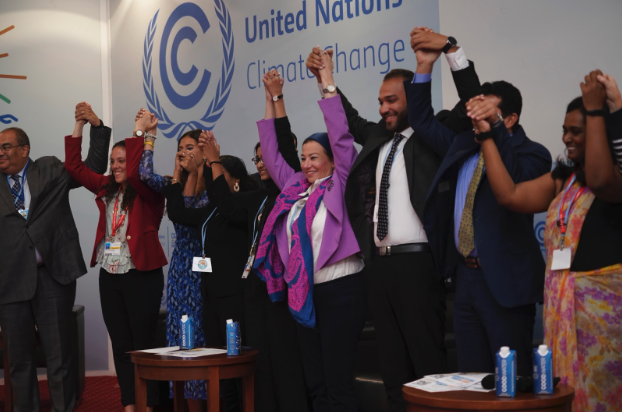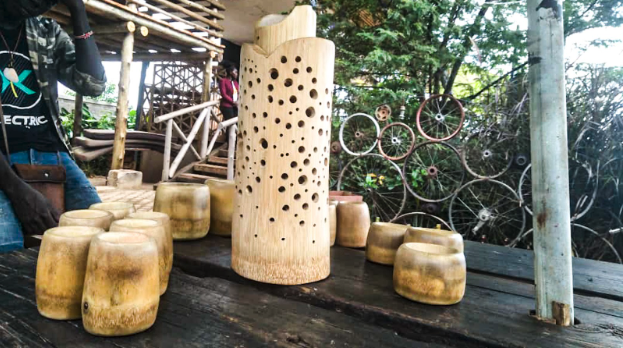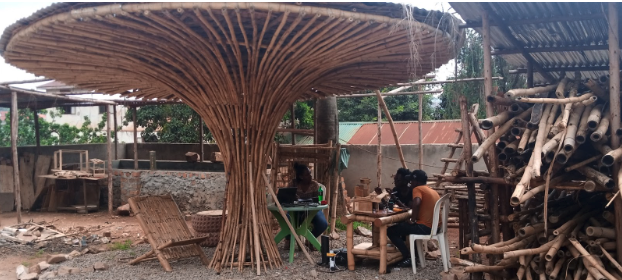“Ensuring that the youth are represented and have a seat at the table is of absolute importance as it is their future lives and livelihoods that are directly impacted with the implementation of climate commitments” - COP27 President H.E. Sameh Shoukry during his recent visit to the Children and Youth Pavilion.
For the first time in the 27 years of the Conference of Parties (COP), there has been a youth-led climate forum, as well as a Children and Youth Pavilion at COP. The Youth and Future Generation Day at the COP on Thursday 10th, November, 2022, sought to ensure that young people were part of the conversation on climate change, action and solutions.

Opening of the Youth and Children Pavilion at COP 27, Sharm El Sheik in Egypt.
Young representatives from the Conference of the Youth (COY) presented the Global Youth Statement, underlining key policy demands which pointed to; Action for Climate Empowerment, Adaptation and Resilience and Accessible Finance.
These were demands determined during COY17 which convened over 1,000 young people from more than 140 countries before the official opening of COP27, and which followed several rich local, national and regional conferences of youth around the world.
28 year old Ndyamuhaki Drake, a climate change activist in Uganda contributing to climate action through his Green Bamboo Concepts business, was part of the youth conference in Uganda where similar thoughts on climate financing were raised, prior to the COP27.
Green Bamboo Concepts in Uganda, which previously employed about 30 youth, has over time been forced to downsize to just three active individuals as a result of budget issues, which were further strained by the COVID19 pandemic and consequential lock down.
According to Ndyamuhaki of Green Bamboo Concepts Uganda, planting bamboo is a beneficially double-edged sword that controls soil erosion, increases the carbon sink in the environment by taking in four times more carbon dioxide than the typical plant, replaces use of plastic products such as straws and cups, and also provides a source of food and medicine. “Bamboo handicrafts and furniture reduce pressure on forest products and the deforestation of trees for hard wood.”

Products made from bamboo by Ndyamuhaki’s team at Bamboo Concepts Centre in Uganda.
Ndyamuhaki is advocating for adoption of a bamboo construction industry as a more environmentally sustainable option, given the fast maturity rate of bamboo trees. According to the Ambient website, bamboo is targeted as a sustainable material because it takes only five to seven years to grow, with some types of bamboo reaching full maturity within a period of 90 days to one year.
In fact, the bamboo trees hold the Guinness World Record for fastest growing plant on earth. With over 1,400 species that can grow even in the most infertile of places and feed both man and animals, bamboo planting could be successfully adopted anywhere in the world.
Ndyamuhaki’s bamboo concept with his co-founder is one of hundreds of climate innovations and solutions by young people in Africa that have potential to be scaled on the continent, but have been limited by a lack of climate solutions funding.

Youth engagement at a bamboo structure in Uganda by the Bamboo Concepts Centre.
Several African youth experts, entrepreneurs and solution makers presented their innovative activities and grassroots initiatives for climate adaptation and mitigation at COP27. The Young Africa session at COP27 kicked off with results of a survey that was done with over 200 African youth, and showcased impressive youth-led solutions from Egypt and the rest of the continent. The results showed that 64% found adaptation as a critical priority that needs to be addressed at COP this year, 84 percent would like to see ‘supporting funding for youth’ as a solution to their concerns.
The dream for the young change makers at Bamboo Concepts Uganda is ‘to be one of the leading social entrepreneurs using Bamboo to curb climate change and tackle poverty.’ Ndyamuhaki and his teammates have a dream to visit China and learn more about bamboo planting, harvesting and value addition in order to widen their knowledge back at home and have more youth on board.
“Our biggest challenge is access to capital and machinery for processing the bamboo. We have several youths who are interested in what we do, but we are unable to support all of them due to budget constraints,” says Ndyamuhaki.
For now, the young and vibrant team at Bamboo concepts is focusing on offering consultations in bamboo architectural designs, bamboo construction and bamboo propagation. They also supply seedlings and help set up nursery beds for new bamboo farmers.
The team also specializes in community outreaches and youth engagements where they have helped more than to start bamboo planting in their communities. Nydamuhaki and colleagues are targeting large scale bamboo planting to create bamboo farms in Uganda, as well as widening the creative and design options in the area of architecture using bamboo.
